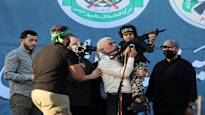The Israeli army and intelligence services have already killed a large part of the leadership of the Hamas terrorist organization. However, Yahya Sinwar is still hiding somewhere in the Gaza Strip.
After Israel killed the military leader of the terrorist organization Hamas Muhammad Deifin and political leader to Ismail Haniyehis next on the kill list the leader of the Gaza Strip Yahya Sinwar.
Such is the “butcher of Khan Younis”, which the Israelis are now chasing with all their might.
In the Gaza Strip, the cause of the Palestinians has been pursued by a group of very different people: some see themselves as working for the freedom of the Palestinian nation, some for the working class and Marxism, some for pure and orthodox Islam.
Sinwar, the leader of Hamas in the Gaza Strip, falls into the latter category.
Sinwar was initially active in Hamas’s Majd forces in Gaza. The Majd forces monitor compliance with the extreme trend of Sunni Islam and punish those who deviate from this. Homosexuality, infidelity or possession of porn all led to severe punishments.
By punishing the Palestinians, Sinwar earned the nickname “The Butcher of Khan Younis” from the Israelis.
Sinwar gradually rose through the ranks of the Hamas organization. By the time of the October 7 attack, he was already an almost messianic figure whose face was known throughout Gaza.
At the beginning of the Gaza war, Sinwar belonged to the Hamas elite, along with military leader Deif and politician Haniyeh.
If you ask Israel, Sinwar will share the fate of his colleagues any day. Since the start of the Gaza war, the Israelis have referred to Sinwar as a “dead man”.
An inconsolable childhood
Born in 1962, Sinwar grew up in a large family in a refugee camp in Gaza’s Khan Younis district, The New Yorker magazine writes in its profile picture.
Childhood was colored by wars and disappointments: The Six-Day War of 1967 was expected to end with the victory of Egypt and the liberation of Palestine. This did not happen, but Israel conquered Gaza, Sinai, the Golan Heights and the West Bank.
In the Gaza Strip, it was grown under conditions of control and use of force by Israeli soldiers. In 1973, the hope of the Palestinians flared up again. Egypt and Syria tried to avenge their defeat in the Yom Kippur War. At first, Israel suffered heavy losses against the surprise attack.
At some point, however, Israel defeated its old enemies. Four years later, the president of Egypt Anwar Sadat traveled to Israel and hoped for peace. In the Gaza Strip, this was seen as a catastrophic betrayal.
Sinwar immersed himself in Gaza’s Islamist youth organizations. Sheik Ahmed Yassin was an important Palestinian leader of his time, a wheelchair-bound preacher.
Around the time of the first intifada in 1987, Yassin founded Hamas, which became the Islamist equivalent of the less religious PLO.
The group committed itself to jihad, a spiritual and military struggle against the adversary. Yassin established a morale control group, or Majdi, in Gaza, which Sinwar joined.
Guardian of morality
In Majdi, Sinwar monitored Palestinians and planned attacks against Israelis. In 1988, Sinwar was arrested for an attack in which two Israeli soldiers were kidnapped and killed and four Palestinians suspected of being traitors were murdered.
Sinwar was already a hardened killer at this point: during interrogations, he said he strangled one victim with his bare hands and suffocated another with a kaffiyeh scarf.
The Israelis sentenced Sinwar to four life terms. Sinwar treated the Israeli prison as an “academy”: he studied Hebrew and Israeli culture to get to know his enemy better. He honed his leadership skills in the community of Palestinian prisoners.
In 2004, an Israeli dentist made Sinwar seek treatment as a result of feeling unwell. Sinwar was diagnosed with a brain tumor and operated on. So the Israelis saved Sinwar’s life.
In 2011, Sinwar was freed when an Israeli soldier kidnapped by Palestinian militants Gilad Shalit it was decided to release 1,026 Hamas prisoners in exchange for their freedom. Sinwar participated in the negotiation of the agreement from prison. Immediately after his freedom, Sinwar, who returned to Gaza, was given the responsibility of organizing the defense of Hamas.
Gaza metro, last stop?
In the leadership of Hamas, Sinwar participated especially in the development of the tunnel and bunker system in the Gaza Strip, the “Gaza Metro”. By 2023, Sinwar’s popularity and speeches only went from strength to strength: he vowed to bring the war against Israel from Palestine to Israeli soil.
The Israeli intelligence apparatus conveyed information to the Israeli leadership about Sinwar’s fanaticism and the threat of an attack, but the leadership did not understand the seriousness of the situation.
Hamas attacked Israel on October 7, 2023. Israelis assume Sinwar and military leader Deif were responsible for planning the attack
Since the start of the Gaza war, Sinwar has likely been living in the Gaza tunnel system. He apparently doesn’t touch his phone or any electronics that could lead to his location being revealed.
Israel has vowed to eliminate the entire Hamas organization responsible for the October attack. Now only Sinwar and a few others remain on the leadership ladder.
And as the war in Gaza has shown, Israel spares no means to achieve its goals.
